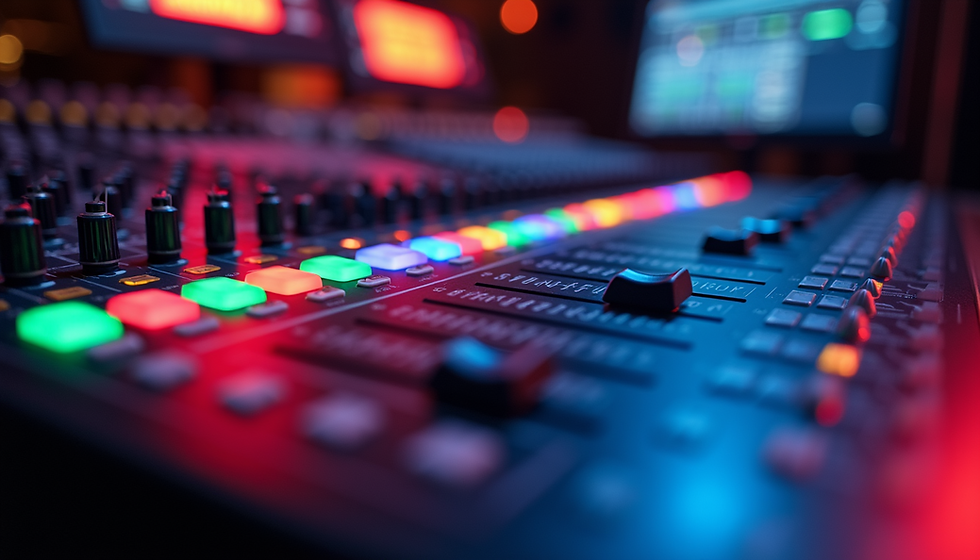Algorithm Fatigue Is Real: Why Musicians Should Post Less, Not More
- Taylor Brooks

- Sep 10, 2025
- 4 min read
In 2025, the pressure for musicians to constantly feed algorithms with content is exhausting creativity, and it may be time for artists to resist the cycle by posting less, not more.
The Algorithm’s Appetite Has No Limits
For the past decade, the music industry has been quietly reengineered by algorithms. Platforms like TikTok, Instagram Reels, and YouTube Shorts have become as important to a musician’s career as touring once was. The common advice has been simple, almost dogmatic: post every day, stay visible, feed the machine.
But here’s the uncomfortable truth—algorithms are designed to always want more. Their hunger is infinite, and no individual artist can sustain that pace without breaking. In 2025, this constant demand has created a new phenomenon: algorithm fatigue. Musicians aren’t just burning out; they’re questioning whether the chase is worth it at all.

When Creativity Turns Into Content
Art thrives on space. Songs are born from lived experiences, reflection, and experimentation. Yet in the algorithm era, musicians are told that their songs are just one piece of content in a never-ending feed. Behind-the-scenes clips, daily updates, reaction skits, and micro-trends all become mandatory tasks.
This shift has led to a strange inversion of priorities. Instead of focusing primarily on making music, artists are prioritizing documenting themselves making music—or worse, faking productivity to satisfy an audience trained to expect constant updates. The result? Shallower connections, overexposure, and a creeping sense that artistry has been replaced by performative marketing.
Algorithm fatigue isn’t just about exhaustion—it’s about erosion. Erosion of focus, of identity, of authenticity. Musicians who once dreamed of stages and studios now spend their days editing vertical videos, hoping the next one might “hit the feed.”
The Myth of More = Success
One of the most damaging myths in today’s industry is the idea that more output automatically equals more opportunity. On the surface, the math makes sense: more posts mean more chances to go viral, right? But algorithms don’t work on simple math—they work on attention.
By oversaturating their own feeds, artists often dilute their impact. A constant barrage of half-hearted posts doesn’t build connection; it builds background noise. Instead of cultivating anticipation for new music, artists risk training their audiences to scroll past them. Ironically, scarcity can sometimes be more powerful than abundance. The artists who create meaningful moments—those who post less but with purpose—often command stronger attention when they do appear. In a digital world of endless noise, intentional silence can be a radical strategy.
Why Posting Less Can Build More
Cutting back on content doesn’t mean abandoning digital platforms. It means using them differently. Posting less allows musicians to focus on depth over volume, storytelling over trends, and connection over clicks.
When artists resist the pressure to post daily, they reclaim time for songwriting, live performance, and genuine collaboration. They also send a subtle but important signal to their audience: I am more than an algorithm, and my value isn’t measured in frequency.
There’s also a psychological benefit. Constantly measuring success by views, likes, and shares breeds anxiety and discouragement. By posting less, musicians can detach from the hamster wheel of metrics and return focus to the craft itself. This recalibration can lead to healthier, more sustainable careers.
Examples of Resistance in 2025
Several notable independent musicians in 2025 have started embracing “slow content” strategies. Instead of posting daily, they curate thoughtful, episodic updates tied to releases or live performances. Some use platforms like Patreon or Bandcamp to deepen relationships with core fans rather than chase virality.
The results have been telling. While these artists may not flood For You Pages every week, they build loyal followings that actually listen—fans who buy tickets, purchase vinyl, and spread music through word-of-mouth.
Even some major-label acts have begun scaling back, recognizing that not every song needs a viral dance trend to thrive. The most impactful careers are increasingly those that balance visibility with intentionality.
Resisting the Pressure
Of course, posting less requires courage. The fear of being forgotten in the feed is real, especially for emerging artists. But musicians must remember that algorithms are not audiences. Algorithms don’t buy tickets, wear merch, or cry at shows—people do.
Artists who treat their audience like humans, not data points, are more likely to build relationships that outlast the latest social media trend. By resisting the pressure to post endlessly, musicians are making a statement: creativity cannot be reduced to a metric.
The Path Forward
The future of music will depend on artists finding sustainable rhythms for visibility. That may mean posting less often, but with greater purpose. It may mean shifting from quantity-driven strategies to community-driven ones. It may even mean redefining success—not as virality, but as longevity.
Algorithm fatigue is real, and it’s reshaping how musicians think about their place in the digital ecosystem. In 2025, posting less isn’t laziness—it’s survival. And perhaps more importantly, it’s a way to protect the sanctity of art in a world that often mistakes it for content.
At STUDIO814, we believe in amplifying voices, celebrating creativity, and connecting music lovers with the artists who inspire them. Stay tuned to our blog for more stories, spotlights, and insights from the ever-evolving world of music.




Comments